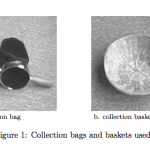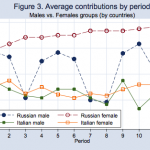Psychology of Conservation
Since it's Sunday and a week since I last blogged (forgive me Father, for I have sinned...), I thought I would keep on the church theme. No nunchuks this week (not even this kind), but I did want to share a study on how money is collected in churches can affect giving.
Economist Adriaan Soetevent collected data from 30 different Baptist churches in the Netherlands. The churches usually use closed collection bags (left) but, for 29 weeks, half of the churches were randomly chosen to replace the closed bags with open baskets (right). With the baskets, neighbors can observe each other 's…
In addition to their notorious beauty, there could be another reason to mail-order a Russian bride. In a study that compared donations to a public goods game by Russian and Italian men and women, Russian females were constantly and, more interesting, increasingly cooperative.
The experiment involved 12 Russians and 12 Italians, made up equally of both genders, who played a public goods game on a computer. Each player started every new round with 10 'currency units' -- which the experimenters would then translate into extra credit in their course. Players have choice of donating none, a…
Almost as soon as you commit yourself to caring about the planet (or anything else), you commit yourself to a lifetime of disappointment (but also infinite room for improvement). As proof, I present news I received in just the last 24 hours specifically related to my work. I am not even talking about the 200,000 potential Haitian earthquake victims, health care and the Massachusetts election, or the use of drones in the military -- I'm merely referring to some back burner conservation news:
1) The UK's Chief Scientific Advisor, John Beddington, is opposing plans to create the world's…
Need a New Year's resolution? Consider signing this seafood boycott.
It's that time of year where we welcome changes and commitment to ideals. New gym memberships. Re-committing to flossing every day. Giving up seafood...
My New Year's resolution was to finally write this blogpost compile a list of people that will boycott seafood (all farmed and wild caught marine and freshwater animals) for 2010 to:
1.demonstrate serious admonition for current fisheries practices (on the whole; we know there are a few localized examples of good management);
2.demonstrate strong support for seafood…
Recently, whenever I go to Starbucks, I see these tall reusable plastic cups for sale that look exactly like the the usual plastic cups (the ones people presumably feel guilty about) that cold drinks come in. Except they are bigger, fatter, reusable, and for sale. This product seems inane because the eco-friendliness is in no way conspicuous (we've come across this before) and, furthermore, you're still drinking out of and using plastic. Can someone explain?
In NewScientist today, there is a little article that describes the different types of carbon offsets you can purchase. It's not too informative and I much prefer articles with a little more of a critical eye, such as this 2007 piece in BusinessWeek or this piece from the NYTimes blog on confusing carbon labels. (By the way, be sure to check out the UK offset parody Cheat Neutral).
Truth is, I have been bored by carbon offsets for ages (ever since I did my master's related to carbon trading--back in 2002, when they were still calling it 'carbon sequestration' and the concept had not yet…
I am traveling in Panama (have been for the last couple weeks, hence the sparse blogposts) as a post-dissertation vacation. I started at Bocas del Toro, which several friends of mine recommended. Despite being somewhat hard to get to, Bocas is overrun with tourism and is thus overrun with overbearing hoteliers and is overpriced (in addition, both bank machines in town went the way of Zimbabwe and were short on cash). The Caribbean's glory days seem over to me: the coral reefs were part beautiful, part wrecked. There were no big fish to be seen. It might not be a bad idea to pour sugar on…
The test is simple: read this sign (recently photographed at my local Vancouver market, which is owned by Whole Foods) then gauge your response...
A neighborhood in Leicester, England had an entire YouTube channel dedicated to neighborhood issues, including catching "litter louts". As BoingBoing point out, this is a fine example of citizen surveillance. This case study also fits very nicely into our discussion of soft enforcement and sousveillence for conservation (it might also spawn a discussion about rights to privacy). The neighborhood has provided an email, and if someone knows the litterers in the videos they can email to alert the neighborhood management board.
Social-norms campaigns are intended to mitigate problem behaviors by conveying the message that problem behavior occurs with far less frequency than people think (e.g. teenage drinking). But for individuals who already abstain from the undesirable behavior, this can actually produce a boomerang effect (similar to the effect we discussed for the Crying Indian PSA) where people see that others are behaving in a certain way and actually do more of the undesired behavior. In other words, there is a tendency toward normalization.
In social messaging, therefore, it is important to build in…
As part of the "Keep America Beautiful" campaign, "The Crying Indian" spot first aired in 1971 and was shown throughout the 1970s and 80s. It won two Clio Awards and was named one of the top 100 advertising campaigns of the 20th Century by Ad Age Magazine:
But research in psychology shows that this public service announcement (PSA) may not have been as effective as is widely believed.
Research by Bob Cialdini at Arizona State University reveals that the PSA's main message -- that we should not litter -- may have been undermined by showing how many people do in fact litter.
In his…
Just as we have renamed fish to make them more marketable, there is a push in conservation (and science in general) to change certain uncommunicative terms to more lucid or dramatic ones. As an article in the NYTimes titled Seeking to Save the Earth, with a Thesaurus points out, it might be useful to replace "global warming" with "our deteriorating atmosphere", especially since conservationists (note: a shift from "environmentalists") are up against coal companies promising "clean, green coal".
In the same way the liberal party needed to begin using frames to manipulate public opinion (as…
As Mark Powell (of the Ocean Conservancy) pointed out in the comments of the last post, Roger Rufe of the Ocean Conservancy said that we need to "use ocean wilderness to lead a new way of thinking about and seeing our oceans through a positive conservation lens, rather than an extractive one." And also that "we must shift our focus from the oceans as fish warehouses and dumpsites and focus on them as natural ocean communities to be cherished and protected."
Agreed.
But this campaign disappeared and, according to Mark Powell, it was because people weren't ready for it. He rightly believes we…
In an extension of first shifting baselines post where Randy Olson and I argued over whether to continue eating seafood, I wrote a guest post last week for The Reef Tank titled What happened to your clients? Um. We ate them. It begins:
"So. What happened to our fish?" asks The Future.
"Um. Well. We ate them," respond the people who were hired to protect the very marine life that directly or indirectly wound up on their dinner table: wild salmon, tuna, coral reefs.
The culprit of the overfishing crisis is small but insatiable: the human stomach. But most people working in marine science…
Jared Flesher discussed this week A Decline in 'Green Guilt' at the NYTimes Green Inc. Blog. Some groups attribute the decline to the fact that Americans are doing more for the environment (more people are carpooling and planting gardens, especially with the economy in its present state) but Flesher gets to what is likely the true culprit: the environment takes the backseat psychologically in times of economic downturn. According to his post:
A recent Gallup poll, for example, found that, for the first time in 25 years, a majority of Americans think economic growth should be given priority…
Call it religious, call it effective (or ineffective), call it trite. The fact is, there is a lot of guilt-laden language in the conservation movement. Because this will help lay the foundation for future discussions, I wanted to present some examples here.
Guilt-free flying and guilt-free vacations are now possible with the emerging market for eco-lodges and carbon offsets:
Drive a hummer guilt-free with carbon credits:
Guilt-free tropical vacations:
Guilt-free fish:
Guilt-free intimates:
Guilt-free organic vodka:
There are also guilt-free SUVs in many different varieties.
And a…
Two new experiments from French scientists show that humans love rare things. Not rarities, as in oddities, as in albinos. But rare things as in: not many of them left. That is bad news for many animals and conservation efforts.
Hypothesis: Humans love rare things. Even if they are not really rare.
Experiment 1 (online last year in Nature Precedings):
A team of French scientists and social went into Parisian luxury hotels that were hosting upper class events and asked 316 people if they would prefer eggs (caviar) from a 'rare species' of sturgeon or a 'common species' of sturgeon, or if…







